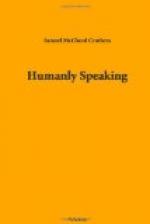One who is in the habit of giving unsolicited advice is likely to take for granted that his advice has been acted upon, even though experience should teach him that this is seldom the case. I had sagely counseled Bagster to go to the New Hampshire woods, in order to recuperate after his multifarious labors. I was therefore surprised to find him playing truant in Rome.
My salutation did not at first cause him to look up. He only made a mysterious sign with his hand. It was evidently a gesture which he had recently learned, and was practiced as a sort of exorcism.
“I am not going to sell you cameos or post cards,” I explained.
When he recognized a familiar face, Bagster forgot all about the Last Judgment, and we were soon out-of-doors and he was telling me about himself.
“I meant to go to Chocorua as you suggested, but the congregation advised otherwise, so I came over here. It seemed the better thing to do. Up in New Hampshire you can’t do much but rest, but here you can improve your taste and collect a good deal of homiletic material. So I’ve settled down in Rome. I want to have time to take it all in.”
“Do you begin to feel rested?” I asked.
“Not yet. It’s harder work than I thought it would be. There’s so much to take in, and it’s all so different. I don’t know how to arrange my material. What I want to do, in the first place, is to have a realizing sense of being in Rome. What’s the use of being here unless you are here in the spirit?
“What I mean is that I should like to feel as I did when I went to Mount Vernon. It was one of those dreamy autumn days when the leaves were just turning. There was the broad Potomac, and the hospitable Virginia mansion. I had the satisfying sense that I was in the home of Washington. Everything seemed to speak of Washington. He filled the whole scene. It was a great experience. Why can’t I feel that way about the great events that happened down there?”
We were by this time on the height of the Janiculum near the statue of Garibaldi. Bagster made a vague gesture toward the city that lay beneath us. There seemed to be something in the scene that worried him. “I can’t make it seem real,” he said. “I have continually to say to myself, ’That is Rome, Italy, and not Rome, New York.’ I can’t make the connection between the place and the historical personages I have read about. I can’t realize that the Epistle to the Romans was written to the people who lived down there. Just back of that new building is the very spot where Romulus would have lived if he had ever existed. On those very streets Scipio Africanus walked, and Caesar and Cicero and Paul and Marcus Aurelius, and Epictetus and Belisarius, and Hildebrand and Michelangelo, and at one time or another about every one you ever heard of. And how many people came to get emotions they couldn’t get anywhere else! There was Goethe. How he felt! He took it all in. And there was Shelley writing poetry in the Baths of Caracalla. And there was Gibbon.”




